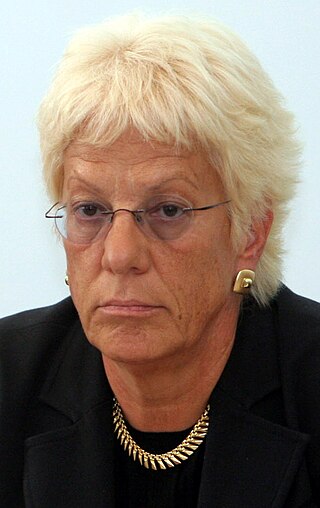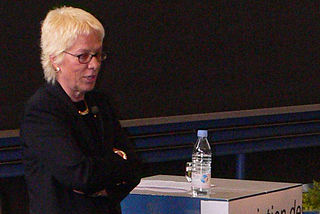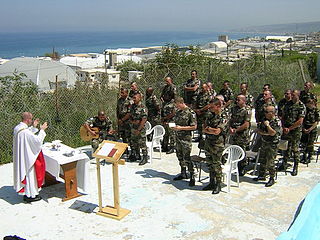
The International Criminal Tribunal for the former Yugoslavia (ICTY) was a body of the United Nations that was established to prosecute the war crimes that had been committed during the Yugoslav Wars and to try their perpetrators. The tribunal was an ad hoc court located in The Hague, Netherlands.

Carla Del Ponte is a Swiss former Chief Prosecutor of two United Nations international criminal law tribunals. A former Swiss attorney general, she was appointed prosecutor for the International Criminal Tribunal for the former Yugoslavia (ICTY) and the International Criminal Tribunal for Rwanda (ICTR) in August 1999, replacing Louise Arbour.
Detlev Mehlis is the Senior Public Prosecutor in the Office of the Attorney General in Berlin. He has 30 years of prosecutorial experience and has led numerous investigations into serious, complex transnational crimes. He has been a senior public prosecutor since 1992 and has, over the course of his career, been responsible for prosecuting terrorism and organized crime cases. Most notably, he investigated the bombing on the discotheque La Belle in then West-Berlin in 1986, which claimed the life of two US soldiers and a Turkish woman, and uncovered the involvement of the Libyan intelligence service. He also proved the involvement of the terrorist Carlos and Syrian diplomats in the attack on the French culture centre Maison de France, also in West-Berlin, in 1983, as well as the involvement of Syrian intelligence services in the bombing of a German-Arab social center in Berlin in 1986. Since 1998, Mehlis has been the Chief of the Contact Office of the European Judicial Network and Coordinator for the fight against organized crime in the State of Berlin.

Serge Brammertz is a Belgian prosecutor, academic and jurist. He serves as the chief prosecutor for the International Residual Mechanism for Criminal Tribunals (IRMCT) since 2016. He also served as the chief prosecutor for the International Criminal Tribunal for the former Yugoslavia (ICTY) from 2008 until its closure in 2017.

The Special Tribunal for Lebanon (STL), also referred to as the Lebanon Tribunal or the Hariri Tribunal, is a tribunal of international character applying Lebanese criminal law under the authority of the United Nations to carry out the investigation and prosecution of those responsible for 14 February 2005 assassination of Rafic Hariri, the former Lebanese prime minister, and the deaths of 21 others, as well as those responsible for connected attacks.

United Nations Security Council Resolution 1636, adopted unanimously on 31 October 2005, after recalling resolutions 1373 (2001), 1566 (2004) and 1595 (2005), the council insisted that the Syrian authorities fully co-operate with the inquiry of the United Nations International Independent Investigation Commission (UNIIIC) into the assassination of former Lebanese Prime Minister Rafic Hariri, not least by arresting the suspects identified by the commission in its final report.
The United Nations International Independent Investigation Commission (UNIIIC) was established on 7 April 2005 by Security Council Resolution 1595 to investigate the assassination of former Prime Minister of Lebanon, Rafic Hariri, who had been killed in Beirut on 14 February 2005.

United Nations Security Council resolution 877, adopted unanimously on 21 October 1993, after recalling 808 (1993) and 827 (1993), the Council appointed the nomination by the Secretary-General Boutros Boutros-Ghali of Mr. Ramón Escovar Salom for the position of Prosecutor at the International Criminal Tribunal for the former Yugoslavia (ICTY).

United Nations Security Council resolution 1503, adopted unanimously on 28 August 2003, after recalling resolutions 827 (1993), 955 (1994), 978 (1995), 1165 (1998), 1166 (1998), 1329 (2000), 1411 (2002), 1431 (2002) and 1481 (2003), the Council decided to split the prosecutorial duties of the International Criminal Tribunal for the former Yugoslavia (ICTY) and the International Criminal Tribunal for Rwanda (ICTR) which had previously been under the responsibility of one official, Carla Del Ponte, since 1999.

On 14 February 2005, former Prime Minister of Lebanon Rafic Hariri was assassinated along with 21 others in an explosion in Beirut, Lebanon. Explosives equivalent to around 1,000 kilograms of TNT were detonated as his motorcade drove near the St. George Hotel. Among the dead were several of Hariri's bodyguards and former Minister of Economy and Trade, Bassel Fleihan.
Daniel Bellemare is a Canadian prosecutor. After retiring from a long career in the Canadian legal system, Bellemare was named as a prosecutor for the United Nations Special Tribunal for Lebanon, until 2012.

United Nations Security Council Resolution 1644, adopted unanimously on 15 December 2005, after recalling resolutions 1373 (2005), 1566 (2004), 1595 (2005) and 1636 (2005), the Council demanded that Syria respond to the inquiry of the United Nations International Independent Investigation Commission (UNIIIC) into the assassination of former Lebanese Prime Minister Rafic Hariri, and extended the investigation until 15 June 2006.

United Nations Security Council Resolution 1664 was adopted unanimously on March 29, 2006; after recalling resolutions 1595 (2005), 1636 (2005) and 1644 (2005), the Council requested the Secretary-General Kofi Annan to consult with the Lebanese government concerning the establishment of an international tribunal to try those responsible for the assassination of Prime Minister Rafic Hariri and 22 others in February 2005.

United Nations Security Council Resolution 1686, adopted unanimously on June 15, 2006, after recalling previous resolutions concerning Lebanon and the region, including 1373 (2001), 1566 (2004), 1595 (2005), 1636 (2005), 1644 (2005) and 1664 (2006), the Council extended the mandate of the United Nations International Independent Investigation Commission (UNIIIC) investigating the assassination of former Lebanese Prime Minister Rafik Hariri for one year.

United Nations Security Council Resolution 2007, unanimously adopted on September 14, 2011, after recalling resolution 1786 (2007) on the International Criminal Tribunal for the former Yugoslavia (ICTY), the Council reappointed Serge Brammertz as prosecutor of the Tribunal, countermanding the Tribunal's statute.

United Nations Security Council Resolution 1748 was unanimously adopted on 27 March 2007.

United Nations Security Council Resolution 1774 was unanimously adopted on 14 September 2007.
United Nations Security Council Resolution 1877 was unanimously adopted on 7 July 2009.

United Nations Security Council Resolution 1815 was unanimously adopted on 2 June 2008.

United Nations Security Council Resolution 1852 was unanimously adopted on 17 December 2008.














